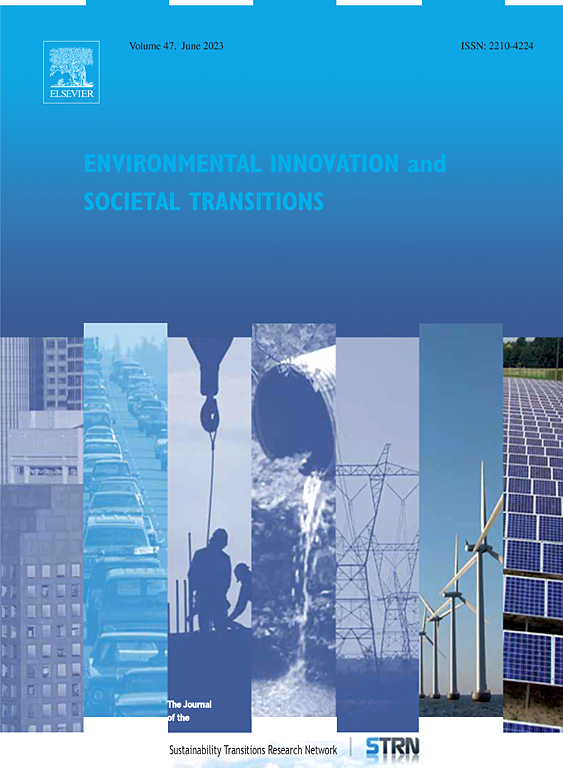Ontological (in)security and sustainability transitions: A theoretical perspective and future research prospects
IF 6.1
2区 经济学
Q1 ENVIRONMENTAL SCIENCES
Environmental Innovation and Societal Transitions
Pub Date : 2025-09-01
DOI:10.1016/j.eist.2025.101042
引用次数: 0
Abstract
This perspective presents the concept of ontological (in)security as an analytical lens to better understand implications of destabilization in sustainability transitions. As an essential human condition, ontological security functions as a firewall against destabilizing dynamics. It is a distinct type of security that connects individual and collective units of analysis and has not been addressed in the context of sustainability transitions. Building upon Anthony Giddens’ definition of ontological security as a sense of stability achieved through the establishment of collective routines and self-narratives, this work aims to unveil novel perspectives for transition theory by explaining underlying mechanisms of actors’ dispositions towards fundamental change and uncertainty in transitions. The previously ignored interactions between transitions and ontological security provide explanations for agents’ emotive responses and phenomena described as transition repercussions. This perspective offers (i) a foundational set of definitions of ontological security and insecurity based on a systematic literature review, (ii) a conceptual heuristic illustrating the relational interactions between transitions and ontological (in)security, and (iii) future directions for transition research to further harness the explanatory potential of ontological (in)security.
安全与可持续性的本体论转换:理论视角与未来研究展望
这种观点提出了本体论(内)安全的概念,作为一个分析镜头,以更好地理解可持续性转型中不稳定的影响。作为一种基本的人类条件,本体论安全起着抵御不稳定动态的防火墙的作用。它是一种独特的安全类型,连接了个人和集体的分析单元,在可持续性过渡的背景下尚未得到解决。在安东尼·吉登斯(Anthony Giddens)将本体论安全定义为通过建立集体惯例和自我叙述实现的稳定感的基础上,本研究旨在通过解释行为者对基本变化的倾向和过渡中的不确定性的潜在机制,揭示过渡理论的新视角。先前被忽视的过渡与本体安全之间的相互作用为主体的情绪反应和被描述为过渡反响的现象提供了解释。这一观点提供了(i)基于系统文献综述的本体论安全和不安全的基本定义,(ii)说明过渡与本体论安全之间关系相互作用的概念启发式,以及(iii)过渡研究的未来方向,以进一步利用本体论安全的解释潜力。
本文章由计算机程序翻译,如有差异,请以英文原文为准。
求助全文
约1分钟内获得全文
求助全文
来源期刊

Environmental Innovation and Societal Transitions
Energy-Renewable Energy, Sustainability and the Environment
CiteScore
13.60
自引率
19.40%
发文量
90
审稿时长
56 days
期刊介绍:
Environmental Innovation and Societal Transitions serves as a platform for reporting studies on innovations and socio-economic transitions aimed at fostering an environmentally sustainable economy, thereby addressing structural resource scarcity and environmental challenges, particularly those associated with fossil energy use and climate change. The journal focuses on various forms of innovation, including technological, organizational, economic, institutional, and political, as well as economy-wide and sectoral changes in areas such as energy, transport, agriculture, and water management. It endeavors to tackle complex questions concerning social, economic, behavioral-psychological, and political barriers and opportunities, along with their intricate interactions. With a multidisciplinary approach and methodological openness, the journal welcomes contributions from a wide array of disciplines within the social, environmental, and innovation sciences.
 求助内容:
求助内容: 应助结果提醒方式:
应助结果提醒方式:


